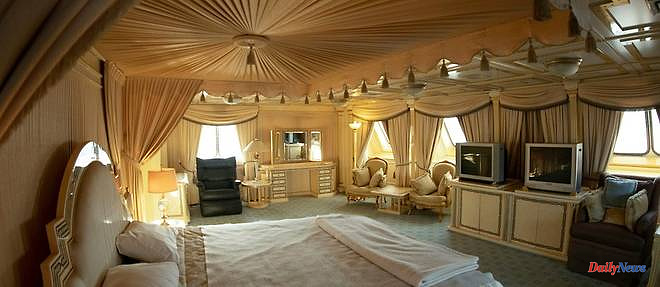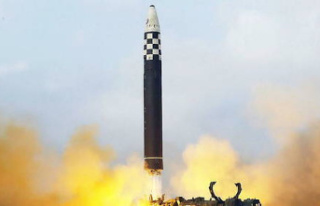One lies stranded on its side in the middle of a river, the other now welcomes visitors. In southern Iraq, two yachts bear witness to the delusions of grandeur of Saddam Hussein, overthrown 20 years ago by an American invasion.
In Basra, Al-Mansour (The victorious, in Arabic) bowed. After being hit by American strikes in March 2003, the 120m long boat finally took on water.
A few hundred meters away, Basrah Breeze, was spared. Moored at a quay on the Shatt al-Arab, a river where the waters of the Tigris and the Euphrates mingle, this second yacht of the former Iraqi dictator has been partly open to the curious since January.
On board, time stood still.
In a salon, a barber chair awaits the client. In the presidential suite in cream and gold tones, a king size bed overlooked by a four-poster mixes with armchairs imitating the 18th century style. In the bathrooms, the faucets are gold.
Nothing too flashy for the former president who ruled Iraq with an iron fist from 1979 to 2003 and was known for his love of ostentatious luxury.
Surprise: Saddam Hussein never sailed the Basrah Breeze. And the luxurious boat has found a second vocation. It is attached to the Center for Maritime Science Research at the University of Basra.
"All those who come are dumbfounded by the luxury of the yacht", recognizes Sajjad Kadhim, teacher at the center.
82 meters long, designed by a Danish shipyard, the yacht delivered to the dictator in 1981 can carry nearly 30 passengers and a crew of 35 people.
There are 13 bedrooms, three meeting rooms, a helipad, not to mention a secret corridor leading to a submarine... to escape in case of danger, as an information panel explains.
"While the Iraqi people were living through the horrors of wars and an embargo, Saddam had such a ship," laments Mr. Kadhim, 48, castigating the "wastage of the old regime".
Fearing the repercussions of the Iran-Iraq war during the 1980s, the dictator had ceded it to the Saudi royal family, before he ended up in Jordan, recalls Mr. Kadhim.
In 2008, while moored in Nice, France, the boat found itself at the heart of a legal saga.
Iraqi authorities claimed ownership after discovering it was being sold for nearly $35 million by a Cayman Islands-based company.
The Iraqi government finally prevailed. But unable to sell it, he finally decided in 2009 to repatriate it to Basra.
"What I like is the old equipment, the fax machine and the old telephones in the control room," academic Abbas al-Maliki told AFP. "It reminded me of the pre-internet era," adds this visitor.
As for the second yacht, Al-Mansour, it is still half submerged, its rusty carcass protruding from the waters of Shatt al-Arab.
Weighing more than 7,000 tons, Al-Mansour was assembled in Finland and delivered in 1983, according to Danish designer Knud E. Hansen's website. It could accommodate 32 passengers and a crew of 65.
Moored in the Gulf just before the 2003 offensive, Saddam had brought it up along the Shatt al-Arab "to protect it from bombing by American planes", says maritime engineer Ali Mohamed. "It was a failure".
In March 2003 "several raids were carried out against the yacht over several days. It was bombed at least three times, but it never sank", says Qahtan al-Obeid, formerly responsible for Heritage in Basra.
In photos taken by AFP in 2003, Al-Mansour can be seen still on the water, the upper floors ravaged by a fire caused by the bombardments. But in June 2003, the boat was already leaning dangerously.
The ship rocked "when the engines were stolen. This created openings and the water rushed in, causing an imbalance", explains Mr. Obeid.
In a country torn apart by decades of war, authorities have launched a campaign to dig out the wreckage of smaller boats stranded in the Shatt al-Arab.
But Al-Mansour “is a very big boat, it has to be cut up and then taken out,” says Obeid. "It will be expensive and difficult."
14/03/2023 20:16:54 -- Bassora (Iraq) (AFP) © 2023 AFP












